PPMP20009: Consolidated Portfolio of Project Management Methodologies
VerifiedAdded on 2023/06/15
|57
|15334
|129
Portfolio
AI Summary
This consolidated portfolio provides an overview of project management methodologies, focusing on their adoption by organizations and impact on stakeholders. It analyzes the major elements of a project management methodology that meet organizational needs, including project scheduling, budget management, and scope evaluation. The portfolio includes discussions on the importance of project governance, planning, and risk management, highlighting the role of the project manager in ensuring project success. The student's learning experience throughout a 12-week course is documented, emphasizing the development of critical thinking and writing skills. The portfolio includes supporting documents and prior learnings, demonstrating a comprehensive understanding of project management principles and practices.
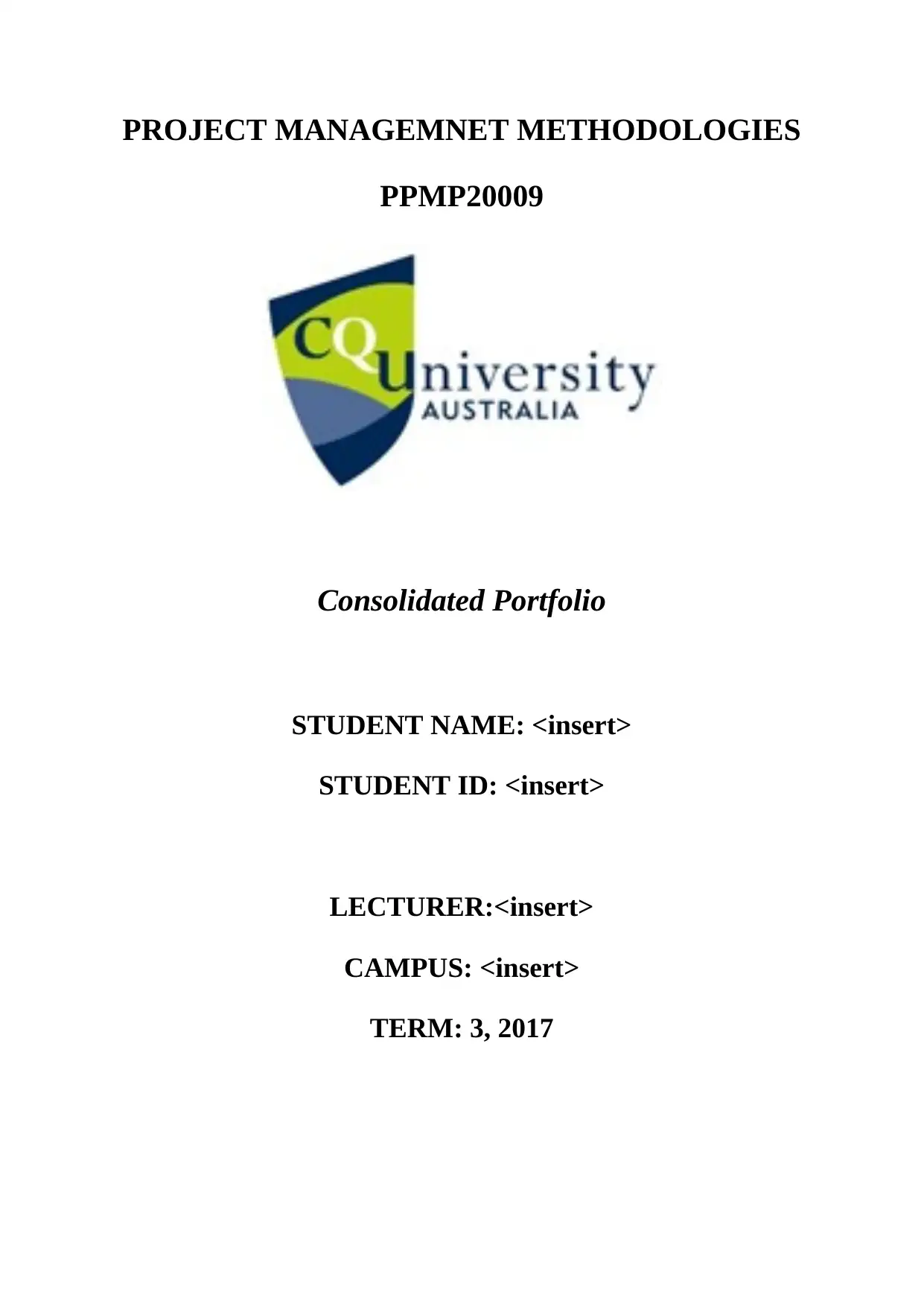
PROJECT MANAGEMNET METHODOLOGIES
PPMP20009
Consolidated Portfolio
STUDENT NAME: <insert>
STUDENT ID: <insert>
LECTURER:<insert>
CAMPUS: <insert>
TERM: 3, 2017
PPMP20009
Consolidated Portfolio
STUDENT NAME: <insert>
STUDENT ID: <insert>
LECTURER:<insert>
CAMPUS: <insert>
TERM: 3, 2017
Paraphrase This Document
Need a fresh take? Get an instant paraphrase of this document with our AI Paraphraser
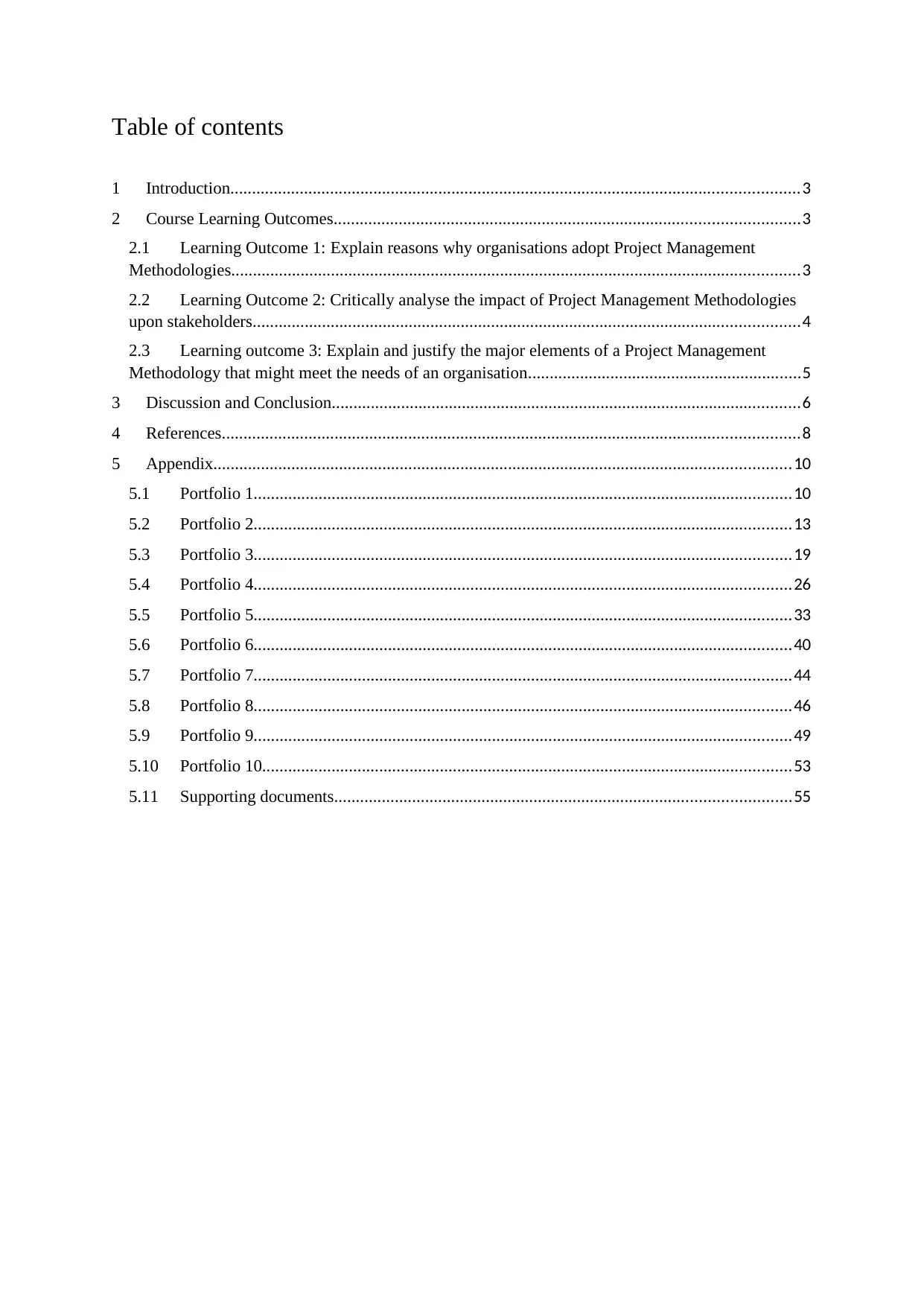
Table of contents
1 Introduction...................................................................................................................................3
2 Course Learning Outcomes...........................................................................................................3
2.1 Learning Outcome 1: Explain reasons why organisations adopt Project Management
Methodologies...................................................................................................................................3
2.2 Learning Outcome 2: Critically analyse the impact of Project Management Methodologies
upon stakeholders..............................................................................................................................4
2.3 Learning outcome 3: Explain and justify the major elements of a Project Management
Methodology that might meet the needs of an organisation...............................................................5
3 Discussion and Conclusion............................................................................................................6
4 References.....................................................................................................................................8
5 Appendix.....................................................................................................................................10
5.1 Portfolio 1............................................................................................................................10
5.2 Portfolio 2............................................................................................................................13
5.3 Portfolio 3............................................................................................................................19
5.4 Portfolio 4............................................................................................................................26
5.5 Portfolio 5............................................................................................................................33
5.6 Portfolio 6............................................................................................................................40
5.7 Portfolio 7............................................................................................................................44
5.8 Portfolio 8............................................................................................................................46
5.9 Portfolio 9............................................................................................................................49
5.10 Portfolio 10..........................................................................................................................53
5.11 Supporting documents.........................................................................................................55
1 Introduction...................................................................................................................................3
2 Course Learning Outcomes...........................................................................................................3
2.1 Learning Outcome 1: Explain reasons why organisations adopt Project Management
Methodologies...................................................................................................................................3
2.2 Learning Outcome 2: Critically analyse the impact of Project Management Methodologies
upon stakeholders..............................................................................................................................4
2.3 Learning outcome 3: Explain and justify the major elements of a Project Management
Methodology that might meet the needs of an organisation...............................................................5
3 Discussion and Conclusion............................................................................................................6
4 References.....................................................................................................................................8
5 Appendix.....................................................................................................................................10
5.1 Portfolio 1............................................................................................................................10
5.2 Portfolio 2............................................................................................................................13
5.3 Portfolio 3............................................................................................................................19
5.4 Portfolio 4............................................................................................................................26
5.5 Portfolio 5............................................................................................................................33
5.6 Portfolio 6............................................................................................................................40
5.7 Portfolio 7............................................................................................................................44
5.8 Portfolio 8............................................................................................................................46
5.9 Portfolio 9............................................................................................................................49
5.10 Portfolio 10..........................................................................................................................53
5.11 Supporting documents.........................................................................................................55
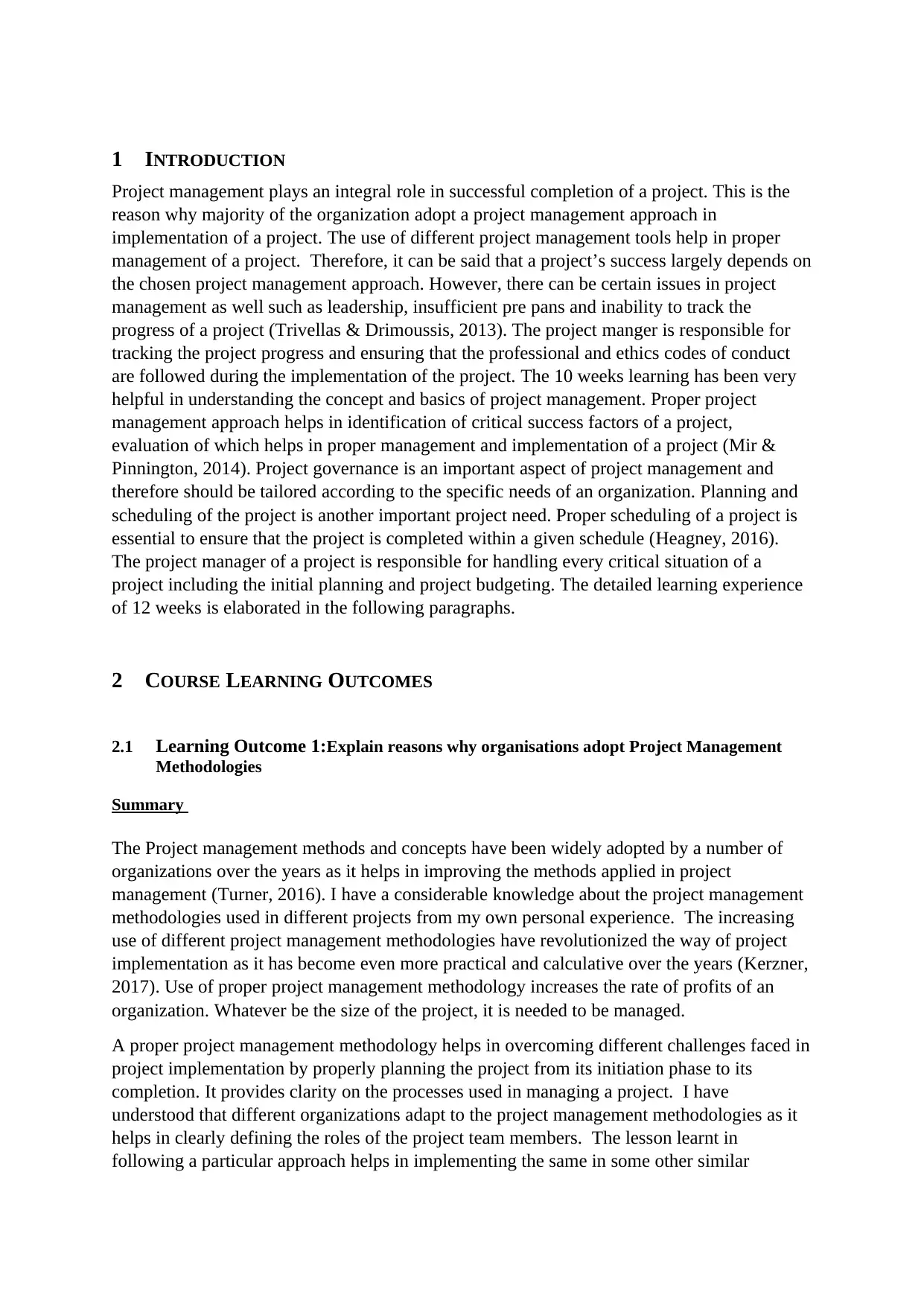
1 INTRODUCTION
Project management plays an integral role in successful completion of a project. This is the
reason why majority of the organization adopt a project management approach in
implementation of a project. The use of different project management tools help in proper
management of a project. Therefore, it can be said that a project’s success largely depends on
the chosen project management approach. However, there can be certain issues in project
management as well such as leadership, insufficient pre pans and inability to track the
progress of a project (Trivellas & Drimoussis, 2013). The project manger is responsible for
tracking the project progress and ensuring that the professional and ethics codes of conduct
are followed during the implementation of the project. The 10 weeks learning has been very
helpful in understanding the concept and basics of project management. Proper project
management approach helps in identification of critical success factors of a project,
evaluation of which helps in proper management and implementation of a project (Mir &
Pinnington, 2014). Project governance is an important aspect of project management and
therefore should be tailored according to the specific needs of an organization. Planning and
scheduling of the project is another important project need. Proper scheduling of a project is
essential to ensure that the project is completed within a given schedule (Heagney, 2016).
The project manager of a project is responsible for handling every critical situation of a
project including the initial planning and project budgeting. The detailed learning experience
of 12 weeks is elaborated in the following paragraphs.
2 COURSE LEARNING OUTCOMES
2.1 Learning Outcome 1:Explain reasons why organisations adopt Project Management
Methodologies
Summary
The Project management methods and concepts have been widely adopted by a number of
organizations over the years as it helps in improving the methods applied in project
management (Turner, 2016). I have a considerable knowledge about the project management
methodologies used in different projects from my own personal experience. The increasing
use of different project management methodologies have revolutionized the way of project
implementation as it has become even more practical and calculative over the years (Kerzner,
2017). Use of proper project management methodology increases the rate of profits of an
organization. Whatever be the size of the project, it is needed to be managed.
A proper project management methodology helps in overcoming different challenges faced in
project implementation by properly planning the project from its initiation phase to its
completion. It provides clarity on the processes used in managing a project. I have
understood that different organizations adapt to the project management methodologies as it
helps in clearly defining the roles of the project team members. The lesson learnt in
following a particular approach helps in implementing the same in some other similar
Project management plays an integral role in successful completion of a project. This is the
reason why majority of the organization adopt a project management approach in
implementation of a project. The use of different project management tools help in proper
management of a project. Therefore, it can be said that a project’s success largely depends on
the chosen project management approach. However, there can be certain issues in project
management as well such as leadership, insufficient pre pans and inability to track the
progress of a project (Trivellas & Drimoussis, 2013). The project manger is responsible for
tracking the project progress and ensuring that the professional and ethics codes of conduct
are followed during the implementation of the project. The 10 weeks learning has been very
helpful in understanding the concept and basics of project management. Proper project
management approach helps in identification of critical success factors of a project,
evaluation of which helps in proper management and implementation of a project (Mir &
Pinnington, 2014). Project governance is an important aspect of project management and
therefore should be tailored according to the specific needs of an organization. Planning and
scheduling of the project is another important project need. Proper scheduling of a project is
essential to ensure that the project is completed within a given schedule (Heagney, 2016).
The project manager of a project is responsible for handling every critical situation of a
project including the initial planning and project budgeting. The detailed learning experience
of 12 weeks is elaborated in the following paragraphs.
2 COURSE LEARNING OUTCOMES
2.1 Learning Outcome 1:Explain reasons why organisations adopt Project Management
Methodologies
Summary
The Project management methods and concepts have been widely adopted by a number of
organizations over the years as it helps in improving the methods applied in project
management (Turner, 2016). I have a considerable knowledge about the project management
methodologies used in different projects from my own personal experience. The increasing
use of different project management methodologies have revolutionized the way of project
implementation as it has become even more practical and calculative over the years (Kerzner,
2017). Use of proper project management methodology increases the rate of profits of an
organization. Whatever be the size of the project, it is needed to be managed.
A proper project management methodology helps in overcoming different challenges faced in
project implementation by properly planning the project from its initiation phase to its
completion. It provides clarity on the processes used in managing a project. I have
understood that different organizations adapt to the project management methodologies as it
helps in clearly defining the roles of the project team members. The lesson learnt in
following a particular approach helps in implementing the same in some other similar
⊘ This is a preview!⊘
Do you want full access?
Subscribe today to unlock all pages.

Trusted by 1+ million students worldwide
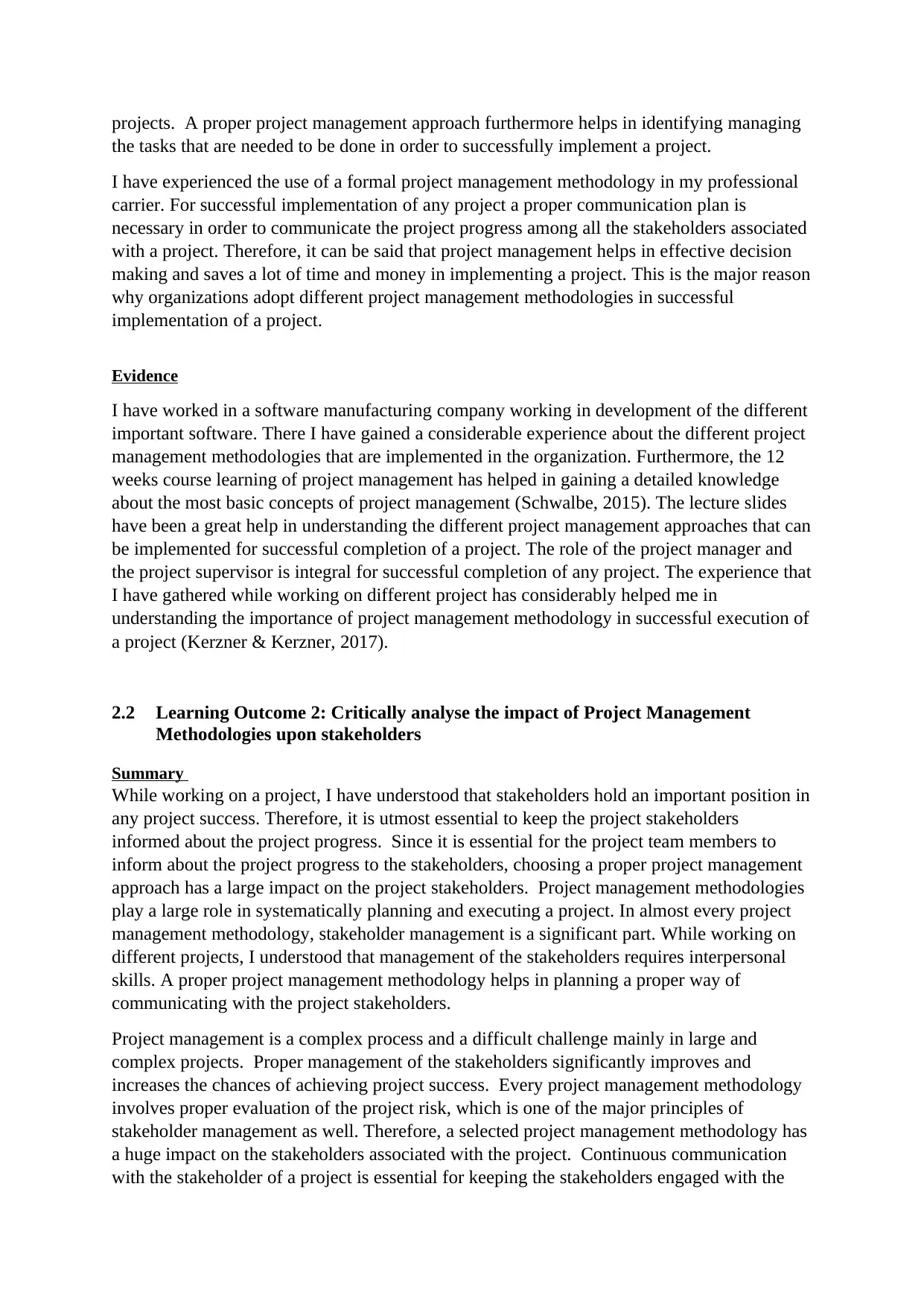
projects. A proper project management approach furthermore helps in identifying managing
the tasks that are needed to be done in order to successfully implement a project.
I have experienced the use of a formal project management methodology in my professional
carrier. For successful implementation of any project a proper communication plan is
necessary in order to communicate the project progress among all the stakeholders associated
with a project. Therefore, it can be said that project management helps in effective decision
making and saves a lot of time and money in implementing a project. This is the major reason
why organizations adopt different project management methodologies in successful
implementation of a project.
Evidence
I have worked in a software manufacturing company working in development of the different
important software. There I have gained a considerable experience about the different project
management methodologies that are implemented in the organization. Furthermore, the 12
weeks course learning of project management has helped in gaining a detailed knowledge
about the most basic concepts of project management (Schwalbe, 2015). The lecture slides
have been a great help in understanding the different project management approaches that can
be implemented for successful completion of a project. The role of the project manager and
the project supervisor is integral for successful completion of any project. The experience that
I have gathered while working on different project has considerably helped me in
understanding the importance of project management methodology in successful execution of
a project (Kerzner & Kerzner, 2017).
2.2 Learning Outcome 2: Critically analyse the impact of Project Management
Methodologies upon stakeholders
Summary
While working on a project, I have understood that stakeholders hold an important position in
any project success. Therefore, it is utmost essential to keep the project stakeholders
informed about the project progress. Since it is essential for the project team members to
inform about the project progress to the stakeholders, choosing a proper project management
approach has a large impact on the project stakeholders. Project management methodologies
play a large role in systematically planning and executing a project. In almost every project
management methodology, stakeholder management is a significant part. While working on
different projects, I understood that management of the stakeholders requires interpersonal
skills. A proper project management methodology helps in planning a proper way of
communicating with the project stakeholders.
Project management is a complex process and a difficult challenge mainly in large and
complex projects. Proper management of the stakeholders significantly improves and
increases the chances of achieving project success. Every project management methodology
involves proper evaluation of the project risk, which is one of the major principles of
stakeholder management as well. Therefore, a selected project management methodology has
a huge impact on the stakeholders associated with the project. Continuous communication
with the stakeholder of a project is essential for keeping the stakeholders engaged with the
the tasks that are needed to be done in order to successfully implement a project.
I have experienced the use of a formal project management methodology in my professional
carrier. For successful implementation of any project a proper communication plan is
necessary in order to communicate the project progress among all the stakeholders associated
with a project. Therefore, it can be said that project management helps in effective decision
making and saves a lot of time and money in implementing a project. This is the major reason
why organizations adopt different project management methodologies in successful
implementation of a project.
Evidence
I have worked in a software manufacturing company working in development of the different
important software. There I have gained a considerable experience about the different project
management methodologies that are implemented in the organization. Furthermore, the 12
weeks course learning of project management has helped in gaining a detailed knowledge
about the most basic concepts of project management (Schwalbe, 2015). The lecture slides
have been a great help in understanding the different project management approaches that can
be implemented for successful completion of a project. The role of the project manager and
the project supervisor is integral for successful completion of any project. The experience that
I have gathered while working on different project has considerably helped me in
understanding the importance of project management methodology in successful execution of
a project (Kerzner & Kerzner, 2017).
2.2 Learning Outcome 2: Critically analyse the impact of Project Management
Methodologies upon stakeholders
Summary
While working on a project, I have understood that stakeholders hold an important position in
any project success. Therefore, it is utmost essential to keep the project stakeholders
informed about the project progress. Since it is essential for the project team members to
inform about the project progress to the stakeholders, choosing a proper project management
approach has a large impact on the project stakeholders. Project management methodologies
play a large role in systematically planning and executing a project. In almost every project
management methodology, stakeholder management is a significant part. While working on
different projects, I understood that management of the stakeholders requires interpersonal
skills. A proper project management methodology helps in planning a proper way of
communicating with the project stakeholders.
Project management is a complex process and a difficult challenge mainly in large and
complex projects. Proper management of the stakeholders significantly improves and
increases the chances of achieving project success. Every project management methodology
involves proper evaluation of the project risk, which is one of the major principles of
stakeholder management as well. Therefore, a selected project management methodology has
a huge impact on the stakeholders associated with the project. Continuous communication
with the stakeholder of a project is essential for keeping the stakeholders engaged with the
Paraphrase This Document
Need a fresh take? Get an instant paraphrase of this document with our AI Paraphraser
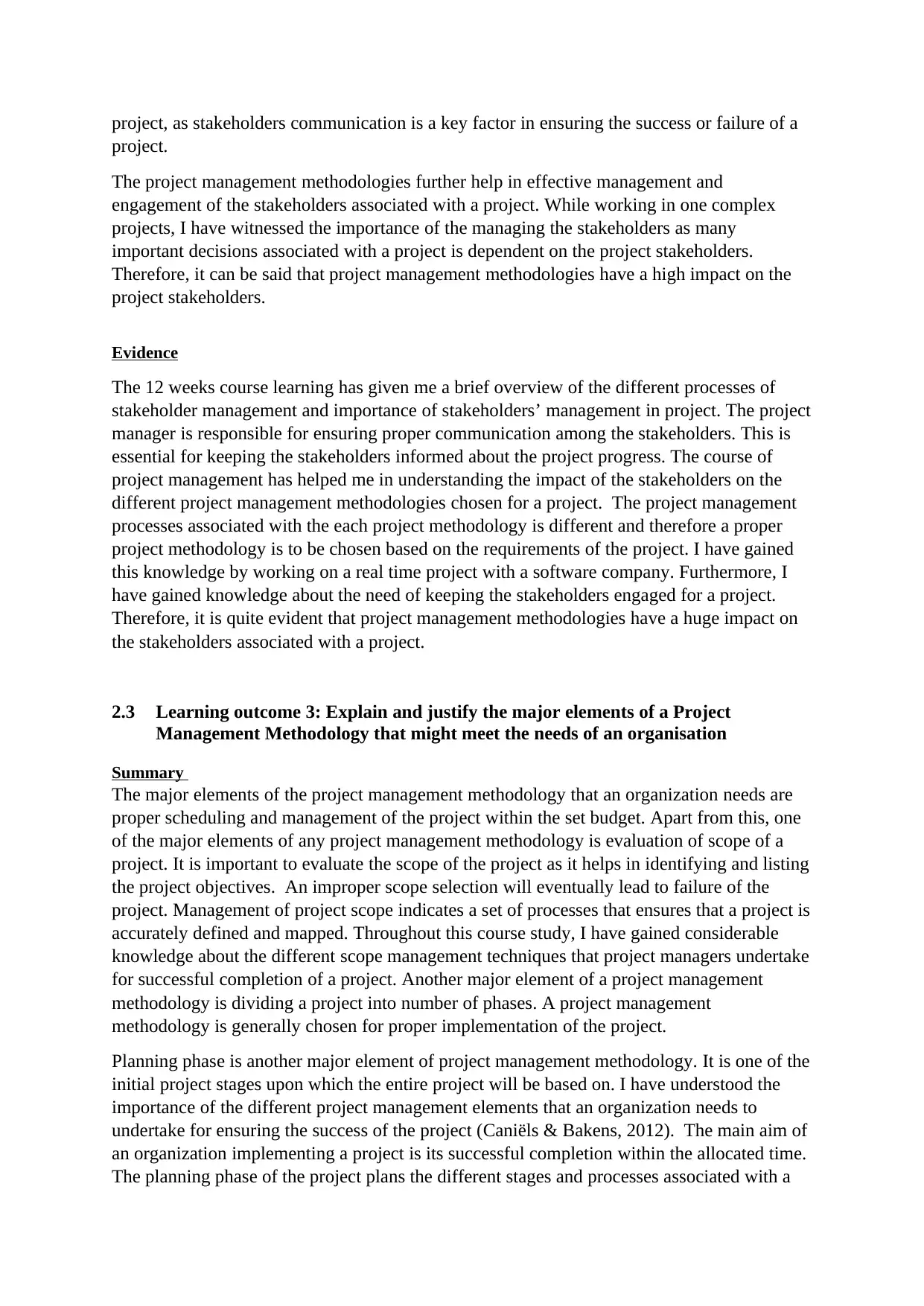
project, as stakeholders communication is a key factor in ensuring the success or failure of a
project.
The project management methodologies further help in effective management and
engagement of the stakeholders associated with a project. While working in one complex
projects, I have witnessed the importance of the managing the stakeholders as many
important decisions associated with a project is dependent on the project stakeholders.
Therefore, it can be said that project management methodologies have a high impact on the
project stakeholders.
Evidence
The 12 weeks course learning has given me a brief overview of the different processes of
stakeholder management and importance of stakeholders’ management in project. The project
manager is responsible for ensuring proper communication among the stakeholders. This is
essential for keeping the stakeholders informed about the project progress. The course of
project management has helped me in understanding the impact of the stakeholders on the
different project management methodologies chosen for a project. The project management
processes associated with the each project methodology is different and therefore a proper
project methodology is to be chosen based on the requirements of the project. I have gained
this knowledge by working on a real time project with a software company. Furthermore, I
have gained knowledge about the need of keeping the stakeholders engaged for a project.
Therefore, it is quite evident that project management methodologies have a huge impact on
the stakeholders associated with a project.
2.3 Learning outcome 3: Explain and justify the major elements of a Project
Management Methodology that might meet the needs of an organisation
Summary
The major elements of the project management methodology that an organization needs are
proper scheduling and management of the project within the set budget. Apart from this, one
of the major elements of any project management methodology is evaluation of scope of a
project. It is important to evaluate the scope of the project as it helps in identifying and listing
the project objectives. An improper scope selection will eventually lead to failure of the
project. Management of project scope indicates a set of processes that ensures that a project is
accurately defined and mapped. Throughout this course study, I have gained considerable
knowledge about the different scope management techniques that project managers undertake
for successful completion of a project. Another major element of a project management
methodology is dividing a project into number of phases. A project management
methodology is generally chosen for proper implementation of the project.
Planning phase is another major element of project management methodology. It is one of the
initial project stages upon which the entire project will be based on. I have understood the
importance of the different project management elements that an organization needs to
undertake for ensuring the success of the project (Caniëls & Bakens, 2012). The main aim of
an organization implementing a project is its successful completion within the allocated time.
The planning phase of the project plans the different stages and processes associated with a
project.
The project management methodologies further help in effective management and
engagement of the stakeholders associated with a project. While working in one complex
projects, I have witnessed the importance of the managing the stakeholders as many
important decisions associated with a project is dependent on the project stakeholders.
Therefore, it can be said that project management methodologies have a high impact on the
project stakeholders.
Evidence
The 12 weeks course learning has given me a brief overview of the different processes of
stakeholder management and importance of stakeholders’ management in project. The project
manager is responsible for ensuring proper communication among the stakeholders. This is
essential for keeping the stakeholders informed about the project progress. The course of
project management has helped me in understanding the impact of the stakeholders on the
different project management methodologies chosen for a project. The project management
processes associated with the each project methodology is different and therefore a proper
project methodology is to be chosen based on the requirements of the project. I have gained
this knowledge by working on a real time project with a software company. Furthermore, I
have gained knowledge about the need of keeping the stakeholders engaged for a project.
Therefore, it is quite evident that project management methodologies have a huge impact on
the stakeholders associated with a project.
2.3 Learning outcome 3: Explain and justify the major elements of a Project
Management Methodology that might meet the needs of an organisation
Summary
The major elements of the project management methodology that an organization needs are
proper scheduling and management of the project within the set budget. Apart from this, one
of the major elements of any project management methodology is evaluation of scope of a
project. It is important to evaluate the scope of the project as it helps in identifying and listing
the project objectives. An improper scope selection will eventually lead to failure of the
project. Management of project scope indicates a set of processes that ensures that a project is
accurately defined and mapped. Throughout this course study, I have gained considerable
knowledge about the different scope management techniques that project managers undertake
for successful completion of a project. Another major element of a project management
methodology is dividing a project into number of phases. A project management
methodology is generally chosen for proper implementation of the project.
Planning phase is another major element of project management methodology. It is one of the
initial project stages upon which the entire project will be based on. I have understood the
importance of the different project management elements that an organization needs to
undertake for ensuring the success of the project (Caniëls & Bakens, 2012). The main aim of
an organization implementing a project is its successful completion within the allocated time.
The planning phase of the project plans the different stages and processes associated with a
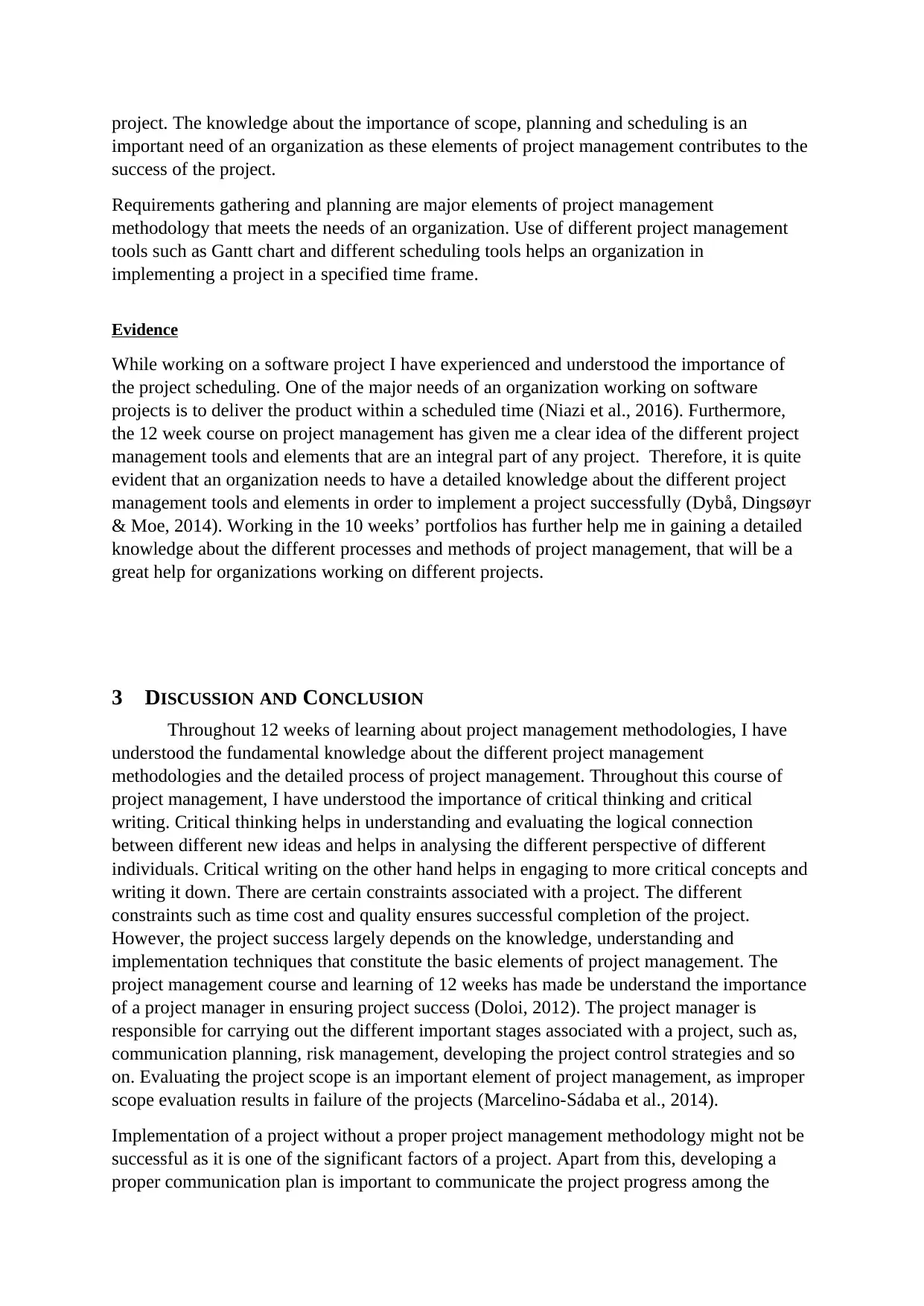
project. The knowledge about the importance of scope, planning and scheduling is an
important need of an organization as these elements of project management contributes to the
success of the project.
Requirements gathering and planning are major elements of project management
methodology that meets the needs of an organization. Use of different project management
tools such as Gantt chart and different scheduling tools helps an organization in
implementing a project in a specified time frame.
Evidence
While working on a software project I have experienced and understood the importance of
the project scheduling. One of the major needs of an organization working on software
projects is to deliver the product within a scheduled time (Niazi et al., 2016). Furthermore,
the 12 week course on project management has given me a clear idea of the different project
management tools and elements that are an integral part of any project. Therefore, it is quite
evident that an organization needs to have a detailed knowledge about the different project
management tools and elements in order to implement a project successfully (Dybå, Dingsøyr
& Moe, 2014). Working in the 10 weeks’ portfolios has further help me in gaining a detailed
knowledge about the different processes and methods of project management, that will be a
great help for organizations working on different projects.
3 DISCUSSION AND CONCLUSION
Throughout 12 weeks of learning about project management methodologies, I have
understood the fundamental knowledge about the different project management
methodologies and the detailed process of project management. Throughout this course of
project management, I have understood the importance of critical thinking and critical
writing. Critical thinking helps in understanding and evaluating the logical connection
between different new ideas and helps in analysing the different perspective of different
individuals. Critical writing on the other hand helps in engaging to more critical concepts and
writing it down. There are certain constraints associated with a project. The different
constraints such as time cost and quality ensures successful completion of the project.
However, the project success largely depends on the knowledge, understanding and
implementation techniques that constitute the basic elements of project management. The
project management course and learning of 12 weeks has made be understand the importance
of a project manager in ensuring project success (Doloi, 2012). The project manager is
responsible for carrying out the different important stages associated with a project, such as,
communication planning, risk management, developing the project control strategies and so
on. Evaluating the project scope is an important element of project management, as improper
scope evaluation results in failure of the projects (Marcelino-Sádaba et al., 2014).
Implementation of a project without a proper project management methodology might not be
successful as it is one of the significant factors of a project. Apart from this, developing a
proper communication plan is important to communicate the project progress among the
important need of an organization as these elements of project management contributes to the
success of the project.
Requirements gathering and planning are major elements of project management
methodology that meets the needs of an organization. Use of different project management
tools such as Gantt chart and different scheduling tools helps an organization in
implementing a project in a specified time frame.
Evidence
While working on a software project I have experienced and understood the importance of
the project scheduling. One of the major needs of an organization working on software
projects is to deliver the product within a scheduled time (Niazi et al., 2016). Furthermore,
the 12 week course on project management has given me a clear idea of the different project
management tools and elements that are an integral part of any project. Therefore, it is quite
evident that an organization needs to have a detailed knowledge about the different project
management tools and elements in order to implement a project successfully (Dybå, Dingsøyr
& Moe, 2014). Working in the 10 weeks’ portfolios has further help me in gaining a detailed
knowledge about the different processes and methods of project management, that will be a
great help for organizations working on different projects.
3 DISCUSSION AND CONCLUSION
Throughout 12 weeks of learning about project management methodologies, I have
understood the fundamental knowledge about the different project management
methodologies and the detailed process of project management. Throughout this course of
project management, I have understood the importance of critical thinking and critical
writing. Critical thinking helps in understanding and evaluating the logical connection
between different new ideas and helps in analysing the different perspective of different
individuals. Critical writing on the other hand helps in engaging to more critical concepts and
writing it down. There are certain constraints associated with a project. The different
constraints such as time cost and quality ensures successful completion of the project.
However, the project success largely depends on the knowledge, understanding and
implementation techniques that constitute the basic elements of project management. The
project management course and learning of 12 weeks has made be understand the importance
of a project manager in ensuring project success (Doloi, 2012). The project manager is
responsible for carrying out the different important stages associated with a project, such as,
communication planning, risk management, developing the project control strategies and so
on. Evaluating the project scope is an important element of project management, as improper
scope evaluation results in failure of the projects (Marcelino-Sádaba et al., 2014).
Implementation of a project without a proper project management methodology might not be
successful as it is one of the significant factors of a project. Apart from this, developing a
proper communication plan is important to communicate the project progress among the
⊘ This is a preview!⊘
Do you want full access?
Subscribe today to unlock all pages.

Trusted by 1+ million students worldwide
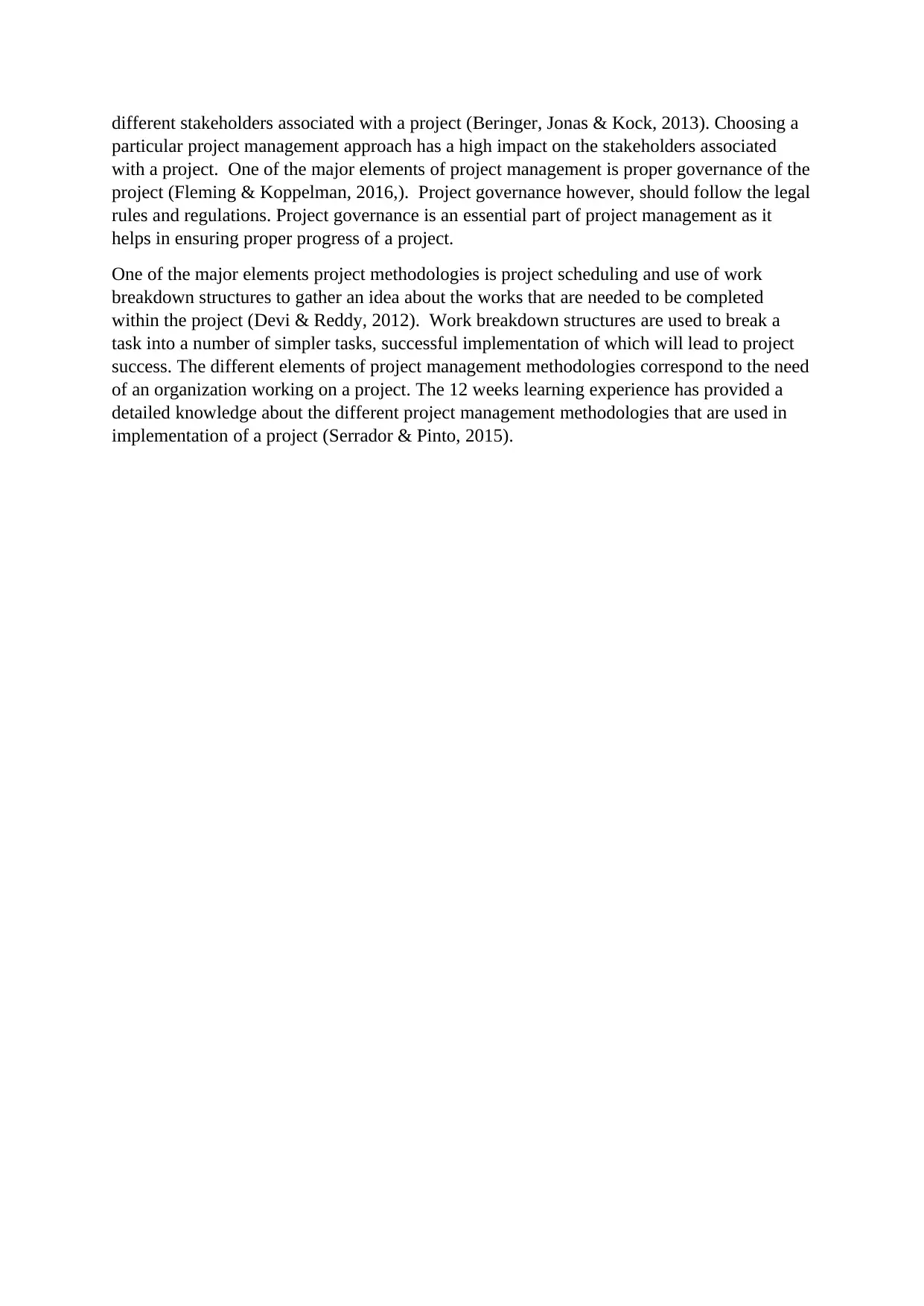
different stakeholders associated with a project (Beringer, Jonas & Kock, 2013). Choosing a
particular project management approach has a high impact on the stakeholders associated
with a project. One of the major elements of project management is proper governance of the
project (Fleming & Koppelman, 2016,). Project governance however, should follow the legal
rules and regulations. Project governance is an essential part of project management as it
helps in ensuring proper progress of a project.
One of the major elements project methodologies is project scheduling and use of work
breakdown structures to gather an idea about the works that are needed to be completed
within the project (Devi & Reddy, 2012). Work breakdown structures are used to break a
task into a number of simpler tasks, successful implementation of which will lead to project
success. The different elements of project management methodologies correspond to the need
of an organization working on a project. The 12 weeks learning experience has provided a
detailed knowledge about the different project management methodologies that are used in
implementation of a project (Serrador & Pinto, 2015).
particular project management approach has a high impact on the stakeholders associated
with a project. One of the major elements of project management is proper governance of the
project (Fleming & Koppelman, 2016,). Project governance however, should follow the legal
rules and regulations. Project governance is an essential part of project management as it
helps in ensuring proper progress of a project.
One of the major elements project methodologies is project scheduling and use of work
breakdown structures to gather an idea about the works that are needed to be completed
within the project (Devi & Reddy, 2012). Work breakdown structures are used to break a
task into a number of simpler tasks, successful implementation of which will lead to project
success. The different elements of project management methodologies correspond to the need
of an organization working on a project. The 12 weeks learning experience has provided a
detailed knowledge about the different project management methodologies that are used in
implementation of a project (Serrador & Pinto, 2015).
Paraphrase This Document
Need a fresh take? Get an instant paraphrase of this document with our AI Paraphraser
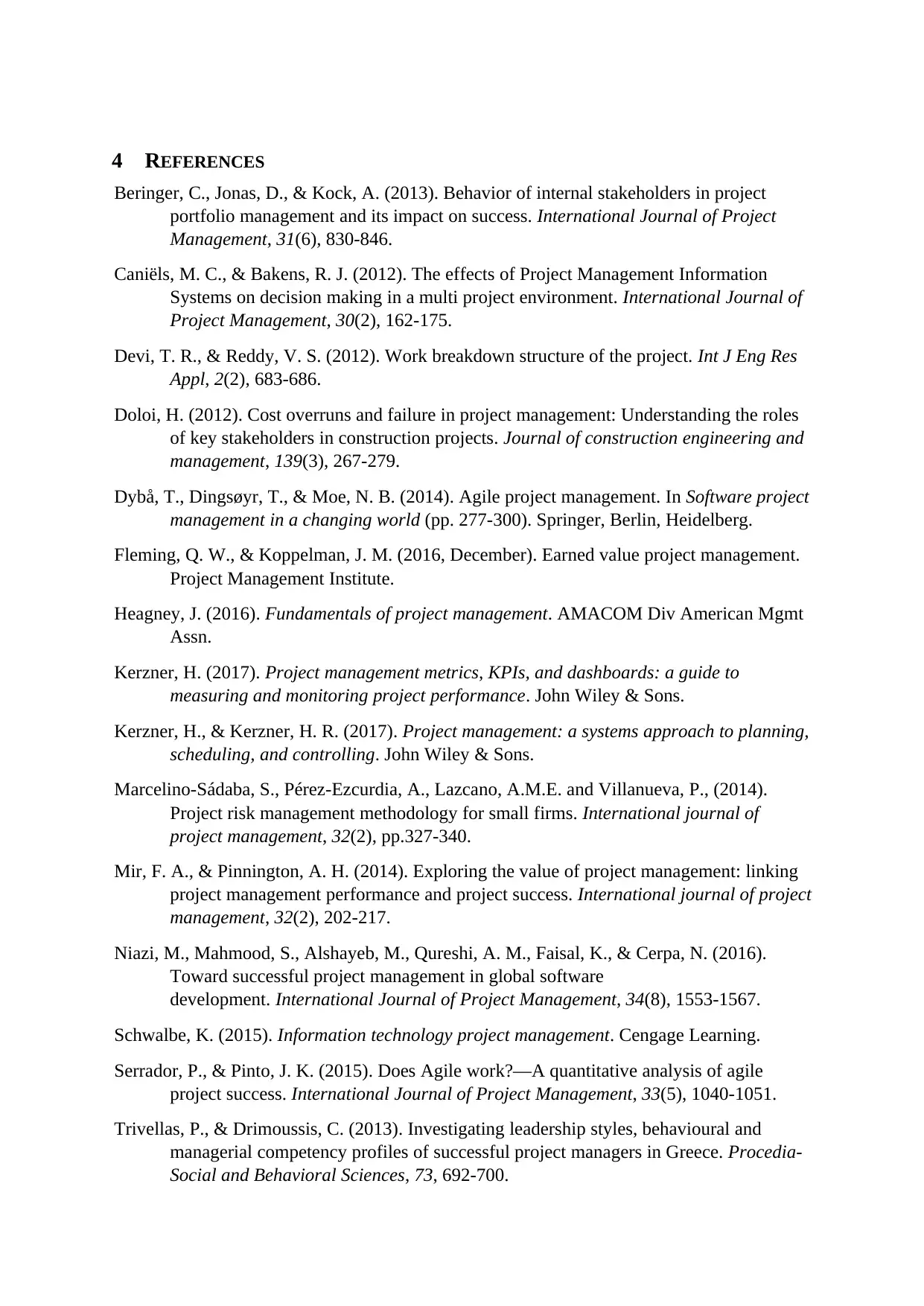
4 REFERENCES
Beringer, C., Jonas, D., & Kock, A. (2013). Behavior of internal stakeholders in project
portfolio management and its impact on success. International Journal of Project
Management, 31(6), 830-846.
Caniëls, M. C., & Bakens, R. J. (2012). The effects of Project Management Information
Systems on decision making in a multi project environment. International Journal of
Project Management, 30(2), 162-175.
Devi, T. R., & Reddy, V. S. (2012). Work breakdown structure of the project. Int J Eng Res
Appl, 2(2), 683-686.
Doloi, H. (2012). Cost overruns and failure in project management: Understanding the roles
of key stakeholders in construction projects. Journal of construction engineering and
management, 139(3), 267-279.
Dybå, T., Dingsøyr, T., & Moe, N. B. (2014). Agile project management. In Software project
management in a changing world (pp. 277-300). Springer, Berlin, Heidelberg.
Fleming, Q. W., & Koppelman, J. M. (2016, December). Earned value project management.
Project Management Institute.
Heagney, J. (2016). Fundamentals of project management. AMACOM Div American Mgmt
Assn.
Kerzner, H. (2017). Project management metrics, KPIs, and dashboards: a guide to
measuring and monitoring project performance. John Wiley & Sons.
Kerzner, H., & Kerzner, H. R. (2017). Project management: a systems approach to planning,
scheduling, and controlling. John Wiley & Sons.
Marcelino-Sádaba, S., Pérez-Ezcurdia, A., Lazcano, A.M.E. and Villanueva, P., (2014).
Project risk management methodology for small firms. International journal of
project management, 32(2), pp.327-340.
Mir, F. A., & Pinnington, A. H. (2014). Exploring the value of project management: linking
project management performance and project success. International journal of project
management, 32(2), 202-217.
Niazi, M., Mahmood, S., Alshayeb, M., Qureshi, A. M., Faisal, K., & Cerpa, N. (2016).
Toward successful project management in global software
development. International Journal of Project Management, 34(8), 1553-1567.
Schwalbe, K. (2015). Information technology project management. Cengage Learning.
Serrador, P., & Pinto, J. K. (2015). Does Agile work?—A quantitative analysis of agile
project success. International Journal of Project Management, 33(5), 1040-1051.
Trivellas, P., & Drimoussis, C. (2013). Investigating leadership styles, behavioural and
managerial competency profiles of successful project managers in Greece. Procedia-
Social and Behavioral Sciences, 73, 692-700.
Beringer, C., Jonas, D., & Kock, A. (2013). Behavior of internal stakeholders in project
portfolio management and its impact on success. International Journal of Project
Management, 31(6), 830-846.
Caniëls, M. C., & Bakens, R. J. (2012). The effects of Project Management Information
Systems on decision making in a multi project environment. International Journal of
Project Management, 30(2), 162-175.
Devi, T. R., & Reddy, V. S. (2012). Work breakdown structure of the project. Int J Eng Res
Appl, 2(2), 683-686.
Doloi, H. (2012). Cost overruns and failure in project management: Understanding the roles
of key stakeholders in construction projects. Journal of construction engineering and
management, 139(3), 267-279.
Dybå, T., Dingsøyr, T., & Moe, N. B. (2014). Agile project management. In Software project
management in a changing world (pp. 277-300). Springer, Berlin, Heidelberg.
Fleming, Q. W., & Koppelman, J. M. (2016, December). Earned value project management.
Project Management Institute.
Heagney, J. (2016). Fundamentals of project management. AMACOM Div American Mgmt
Assn.
Kerzner, H. (2017). Project management metrics, KPIs, and dashboards: a guide to
measuring and monitoring project performance. John Wiley & Sons.
Kerzner, H., & Kerzner, H. R. (2017). Project management: a systems approach to planning,
scheduling, and controlling. John Wiley & Sons.
Marcelino-Sádaba, S., Pérez-Ezcurdia, A., Lazcano, A.M.E. and Villanueva, P., (2014).
Project risk management methodology for small firms. International journal of
project management, 32(2), pp.327-340.
Mir, F. A., & Pinnington, A. H. (2014). Exploring the value of project management: linking
project management performance and project success. International journal of project
management, 32(2), 202-217.
Niazi, M., Mahmood, S., Alshayeb, M., Qureshi, A. M., Faisal, K., & Cerpa, N. (2016).
Toward successful project management in global software
development. International Journal of Project Management, 34(8), 1553-1567.
Schwalbe, K. (2015). Information technology project management. Cengage Learning.
Serrador, P., & Pinto, J. K. (2015). Does Agile work?—A quantitative analysis of agile
project success. International Journal of Project Management, 33(5), 1040-1051.
Trivellas, P., & Drimoussis, C. (2013). Investigating leadership styles, behavioural and
managerial competency profiles of successful project managers in Greece. Procedia-
Social and Behavioral Sciences, 73, 692-700.

Turner, R. (2016). Gower handbook of project management. Routledge.
⊘ This is a preview!⊘
Do you want full access?
Subscribe today to unlock all pages.

Trusted by 1+ million students worldwide
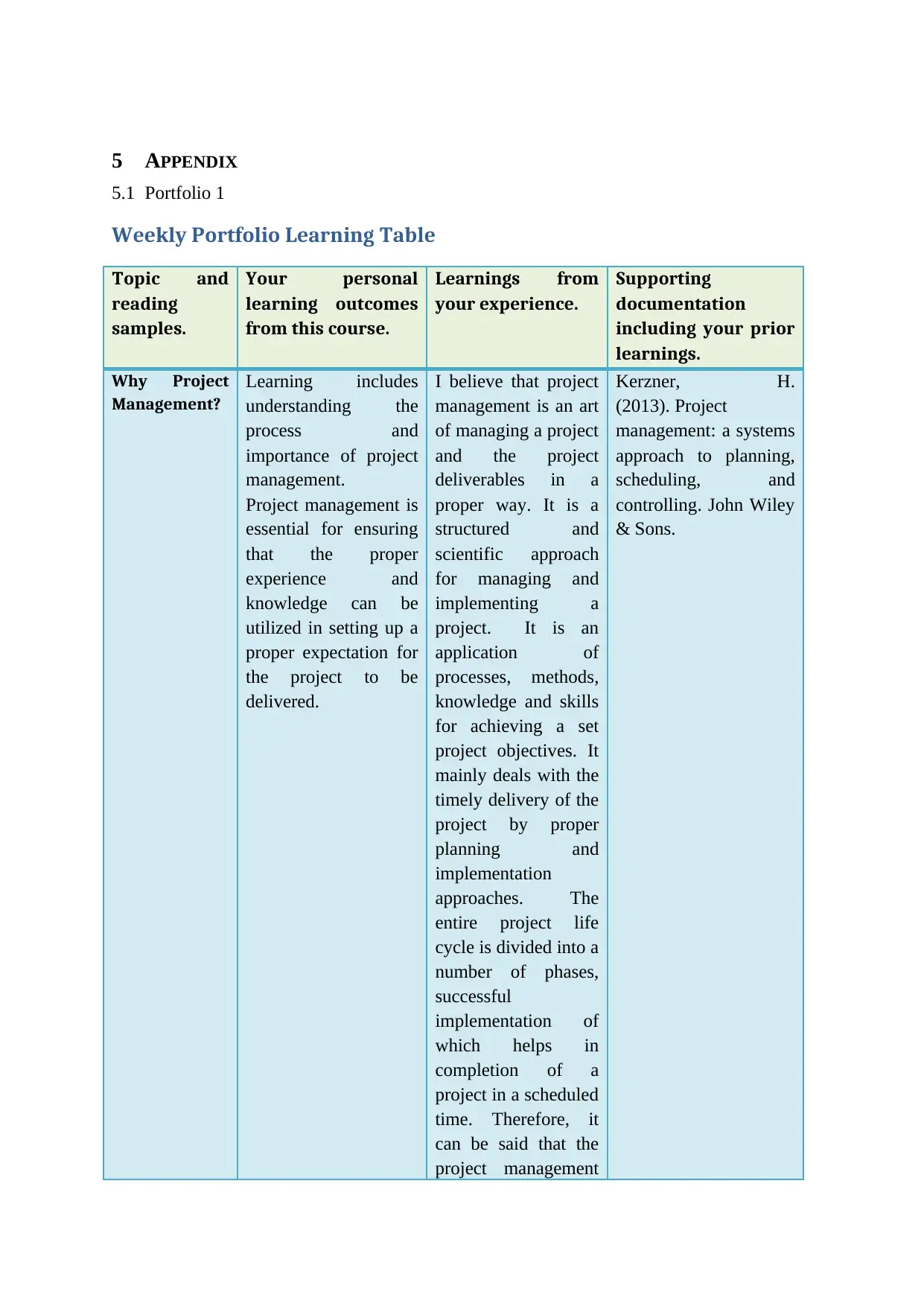
5 APPENDIX
5.1 Portfolio 1
Weekly Portfolio Learning Table
Topic and
reading
samples.
Your personal
learning outcomes
from this course.
Learnings from
your experience.
Supporting
documentation
including your prior
learnings.
Why Project
Management?
Learning includes
understanding the
process and
importance of project
management.
Project management is
essential for ensuring
that the proper
experience and
knowledge can be
utilized in setting up a
proper expectation for
the project to be
delivered.
I believe that project
management is an art
of managing a project
and the project
deliverables in a
proper way. It is a
structured and
scientific approach
for managing and
implementing a
project. It is an
application of
processes, methods,
knowledge and skills
for achieving a set
project objectives. It
mainly deals with the
timely delivery of the
project by proper
planning and
implementation
approaches. The
entire project life
cycle is divided into a
number of phases,
successful
implementation of
which helps in
completion of a
project in a scheduled
time. Therefore, it
can be said that the
project management
Kerzner, H.
(2013). Project
management: a systems
approach to planning,
scheduling, and
controlling. John Wiley
& Sons.
5.1 Portfolio 1
Weekly Portfolio Learning Table
Topic and
reading
samples.
Your personal
learning outcomes
from this course.
Learnings from
your experience.
Supporting
documentation
including your prior
learnings.
Why Project
Management?
Learning includes
understanding the
process and
importance of project
management.
Project management is
essential for ensuring
that the proper
experience and
knowledge can be
utilized in setting up a
proper expectation for
the project to be
delivered.
I believe that project
management is an art
of managing a project
and the project
deliverables in a
proper way. It is a
structured and
scientific approach
for managing and
implementing a
project. It is an
application of
processes, methods,
knowledge and skills
for achieving a set
project objectives. It
mainly deals with the
timely delivery of the
project by proper
planning and
implementation
approaches. The
entire project life
cycle is divided into a
number of phases,
successful
implementation of
which helps in
completion of a
project in a scheduled
time. Therefore, it
can be said that the
project management
Kerzner, H.
(2013). Project
management: a systems
approach to planning,
scheduling, and
controlling. John Wiley
& Sons.
Paraphrase This Document
Need a fresh take? Get an instant paraphrase of this document with our AI Paraphraser
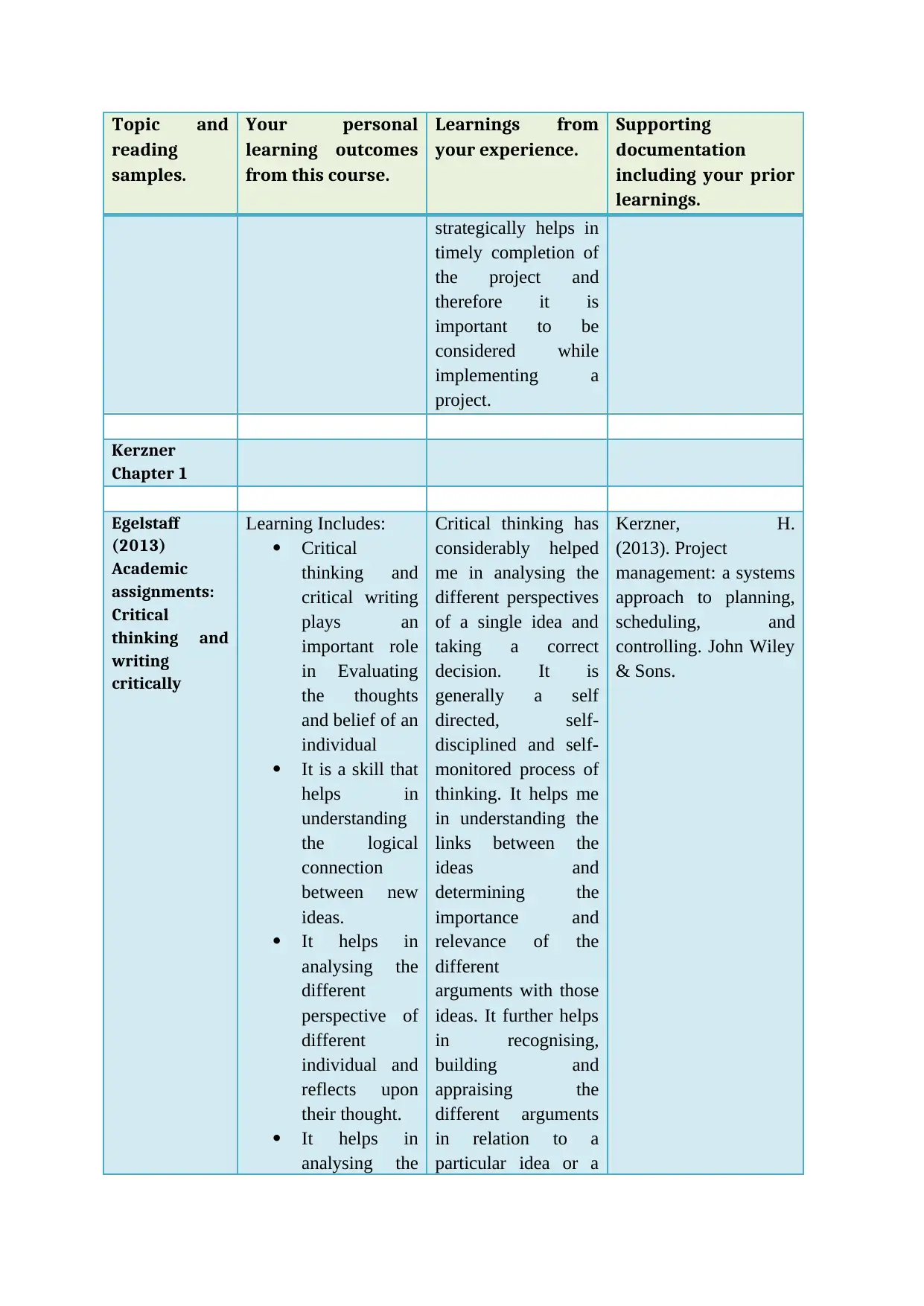
Topic and
reading
samples.
Your personal
learning outcomes
from this course.
Learnings from
your experience.
Supporting
documentation
including your prior
learnings.
strategically helps in
timely completion of
the project and
therefore it is
important to be
considered while
implementing a
project.
Kerzner
Chapter 1
Egelstaff
(2013)
Academic
assignments:
Critical
thinking and
writing
critically
Learning Includes:
Critical
thinking and
critical writing
plays an
important role
in Evaluating
the thoughts
and belief of an
individual
It is a skill that
helps in
understanding
the logical
connection
between new
ideas.
It helps in
analysing the
different
perspective of
different
individual and
reflects upon
their thought.
It helps in
analysing the
Critical thinking has
considerably helped
me in analysing the
different perspectives
of a single idea and
taking a correct
decision. It is
generally a self
directed, self-
disciplined and self-
monitored process of
thinking. It helps me
in understanding the
links between the
ideas and
determining the
importance and
relevance of the
different
arguments with those
ideas. It further helps
in recognising,
building and
appraising the
different arguments
in relation to a
particular idea or a
Kerzner, H.
(2013). Project
management: a systems
approach to planning,
scheduling, and
controlling. John Wiley
& Sons.
reading
samples.
Your personal
learning outcomes
from this course.
Learnings from
your experience.
Supporting
documentation
including your prior
learnings.
strategically helps in
timely completion of
the project and
therefore it is
important to be
considered while
implementing a
project.
Kerzner
Chapter 1
Egelstaff
(2013)
Academic
assignments:
Critical
thinking and
writing
critically
Learning Includes:
Critical
thinking and
critical writing
plays an
important role
in Evaluating
the thoughts
and belief of an
individual
It is a skill that
helps in
understanding
the logical
connection
between new
ideas.
It helps in
analysing the
different
perspective of
different
individual and
reflects upon
their thought.
It helps in
analysing the
Critical thinking has
considerably helped
me in analysing the
different perspectives
of a single idea and
taking a correct
decision. It is
generally a self
directed, self-
disciplined and self-
monitored process of
thinking. It helps me
in understanding the
links between the
ideas and
determining the
importance and
relevance of the
different
arguments with those
ideas. It further helps
in recognising,
building and
appraising the
different arguments
in relation to a
particular idea or a
Kerzner, H.
(2013). Project
management: a systems
approach to planning,
scheduling, and
controlling. John Wiley
& Sons.
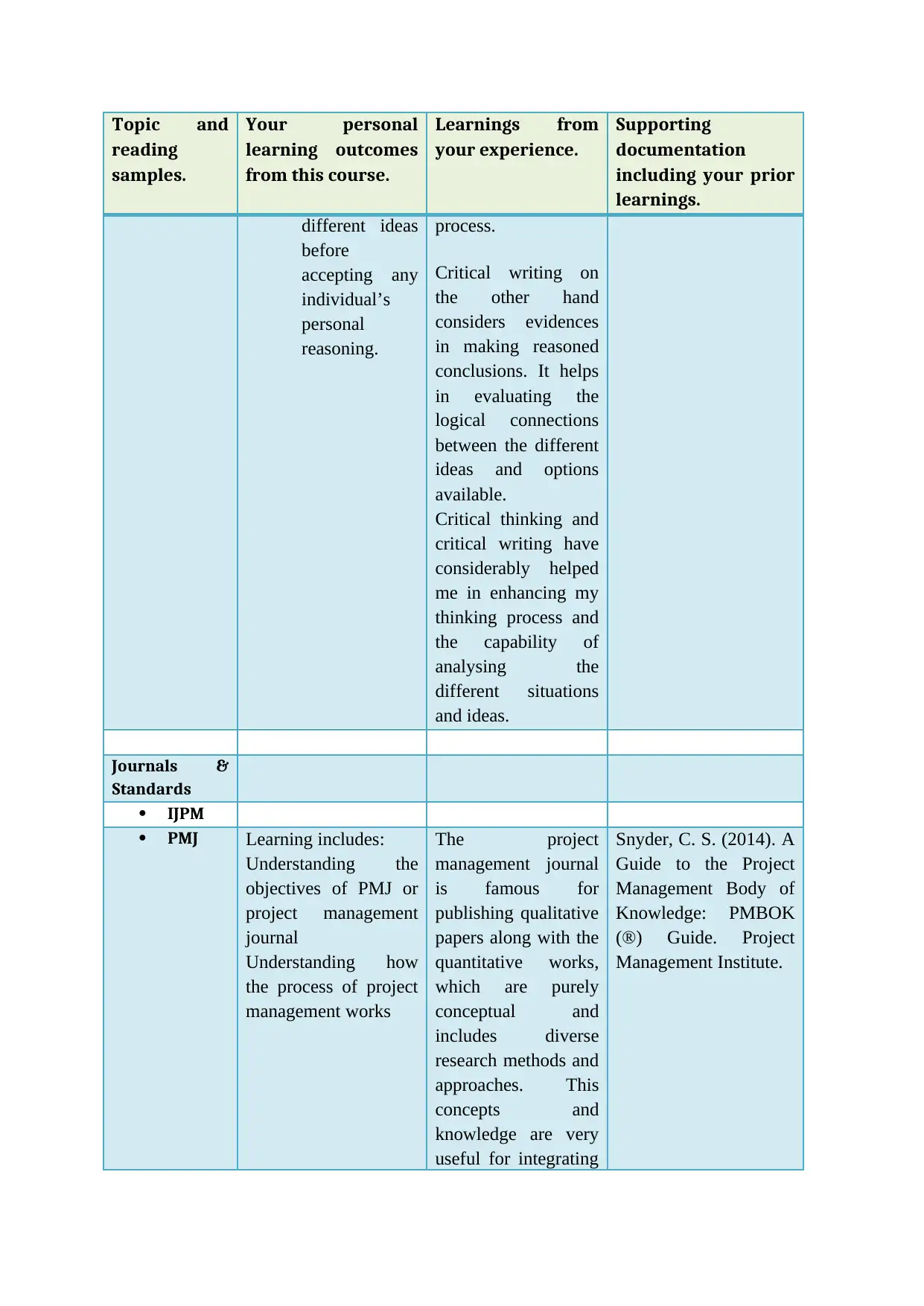
Topic and
reading
samples.
Your personal
learning outcomes
from this course.
Learnings from
your experience.
Supporting
documentation
including your prior
learnings.
different ideas
before
accepting any
individual’s
personal
reasoning.
process.
Critical writing on
the other hand
considers evidences
in making reasoned
conclusions. It helps
in evaluating the
logical connections
between the different
ideas and options
available.
Critical thinking and
critical writing have
considerably helped
me in enhancing my
thinking process and
the capability of
analysing the
different situations
and ideas.
Journals &
Standards
IJPM
PMJ Learning includes:
Understanding the
objectives of PMJ or
project management
journal
Understanding how
the process of project
management works
The project
management journal
is famous for
publishing qualitative
papers along with the
quantitative works,
which are purely
conceptual and
includes diverse
research methods and
approaches. This
concepts and
knowledge are very
useful for integrating
Snyder, C. S. (2014). A
Guide to the Project
Management Body of
Knowledge: PMBOK
(®) Guide. Project
Management Institute.
reading
samples.
Your personal
learning outcomes
from this course.
Learnings from
your experience.
Supporting
documentation
including your prior
learnings.
different ideas
before
accepting any
individual’s
personal
reasoning.
process.
Critical writing on
the other hand
considers evidences
in making reasoned
conclusions. It helps
in evaluating the
logical connections
between the different
ideas and options
available.
Critical thinking and
critical writing have
considerably helped
me in enhancing my
thinking process and
the capability of
analysing the
different situations
and ideas.
Journals &
Standards
IJPM
PMJ Learning includes:
Understanding the
objectives of PMJ or
project management
journal
Understanding how
the process of project
management works
The project
management journal
is famous for
publishing qualitative
papers along with the
quantitative works,
which are purely
conceptual and
includes diverse
research methods and
approaches. This
concepts and
knowledge are very
useful for integrating
Snyder, C. S. (2014). A
Guide to the Project
Management Body of
Knowledge: PMBOK
(®) Guide. Project
Management Institute.
⊘ This is a preview!⊘
Do you want full access?
Subscribe today to unlock all pages.

Trusted by 1+ million students worldwide
1 out of 57
Related Documents
Your All-in-One AI-Powered Toolkit for Academic Success.
+13062052269
info@desklib.com
Available 24*7 on WhatsApp / Email
![[object Object]](/_next/static/media/star-bottom.7253800d.svg)
Unlock your academic potential
Copyright © 2020–2026 A2Z Services. All Rights Reserved. Developed and managed by ZUCOL.
